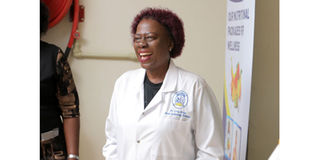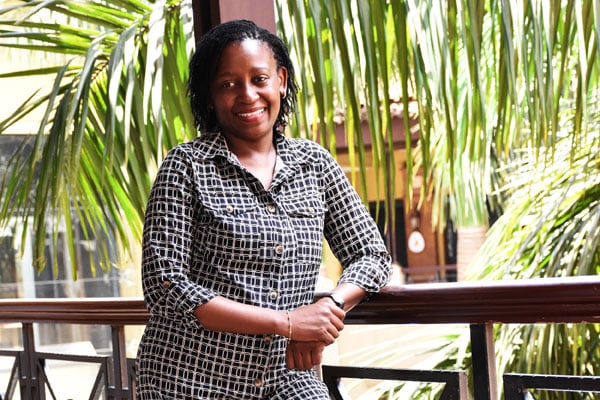Prime
I mentor, train women to love science - Dr Kityo

Dr Kityo advises stakeholders to provide more funding to research, especially in the science field. PHOTO | BEATRICE NAKIBUUKA
What you need to know:
- Dr Cissy Kityo Mutuluuza is an experienced specialist medical doctor, vaccinologist and public health expert with more than 31 years’ experience in conducting and coordinating Aids research and care for HIV patients. She advises women to take up the many scholarship opportunities targeting women in the science field, writes Beatrice Nakibuuka.
Dr Cissy Kityo Mutuluuza, the executive director of the Joint Clinical Research Centre (JCRC), joined the institution in September 1992 as a young researcher who had just obtained her first degree in medicine and surgery.
During her internship, she worked at Nsambya Hospital in Kampala as a medical officer in charge of the paediatric ward and while there, she was requested to take part in a research project funded by the World Health Organisation. The research study aimed at drawing a clear picture of HIV/Aids in children.
She has been able to go through the ranks, from a research associate, coordinator for the institution and deputy director research and clinical services to deputy executive and then the executive director in September 2017.
During this time, she has attained a masters’ degree in international health and vaccinology at John Hopkins University in the United States where she was offered a scholarship in 1999. The scholarship aimed at training a group of scientists who would be part of the HIV vaccine prevention trials. She also completed her PhD studies while at the institution.
Her journey
Dr Kityo has been at the forefront of scaling up HIV treatment in Uganda. She has been principal investigator and Co-PI for operational, clinical and epidemiological trials of HIV treatment and associated infections including Tuberculosis, as well as intervention studies aimed at preventing HIV transmission and preparation for HIV vaccines.
She spearheaded the development of the JCRC clinical and research laboratory equipped to perform a variety of tests and research studies including molecular biology, HIV resistance, Tuberculosis, HIV vaccine trials, pharmacokinetic studies, clinical, and epidemiological research among others.
Programme projects that she has overseen over the years included field work and extension of ARVs to other districts in Uganda. As a member of the Aids Task force in Uganda and previously chair of the Uganda Aids Clinical Care sub-committee, Dr Kityo was involved in planning and writing the first strategic plan for the national programme to increase access to care and ARVs and the national ARV policy.
Groundbreaking research
When Dr Kityo joined JCRC, there were two main tasks; research into the treatment of HIV and evaluating herbal preparations, since laboratories already existed.
“With time, we started HIV patient care not only treating their symptoms but providing free ARVs. This was a game changer because at that time, these medicines were very expensive and hard to get,” she says.
From the training she had acquired, her team started the first HIV prevention vaccine trial in Sub-Saharan Africa and the first HIV therapeutic trial that is given to HIV patients to stimulate immunity so that they do not have to take ARVs. Although this did not work at the time, Dr Kityo says there are still efforts geared towards continuous research until positive results are attained.
“I continue to lead the institution so that I am at the helm of groundbreaking research, including a trial that is evaluating injectable ARVs every two months instead of a daily pill,” she days.
Future plans
As an institute, Dr Kityo wants JCRC to be a centre that provides long acting treatment that after the two months' injection, a research into six months' injection will follow so that people with HIV do not have to take the daily pill.
She intends to lead the institution in research into other diseases such as cardiovascular diseases and sickle cell disease. Dr Kityo also wants to see the institution develop vaccines for emergency infections such as Ebola, Marburg.
The JCRC under Dr Kityo’s leadership is part of the Brilliant Consortium and the Global Gene Therapy Initiative (GGTI) to address the gaps that are preventing gene therapy research in different countries.
The institution is in the process of getting the bone marrow transplant operational. It was commissioned in October 2023. There are three doctors that are undergoing training in India.
More women into research
Dr Kityo says she is glad that today, more women are involved in research.
“There are many research scholarships targeting women in the science field but sometimes we fail to get any applicants. I now try to look for, mentor and train women to be able to take up these opportunities,” she says.
“I advise women to embrace science and be dedicated since research involves spending long hours reading. It is not easy but it is doable. One just has to be assertive, confident and resilient, especially when you do not get the desired results,” she advises.
Challenges
Funding is one of the biggest challenges facing research in Uganda. If the institute is to carry out the gene therapy, there is need for funding to put up the infrastructure, retain and maintain good scientists, repair and maintain the equipment, and do research.
“There is limited funding from the government to this institution. All this work we have done is because we have funding from collaborations. There is a lot we need to do and, therefore, a lot more funding is needed,” Dr Kityo says.




